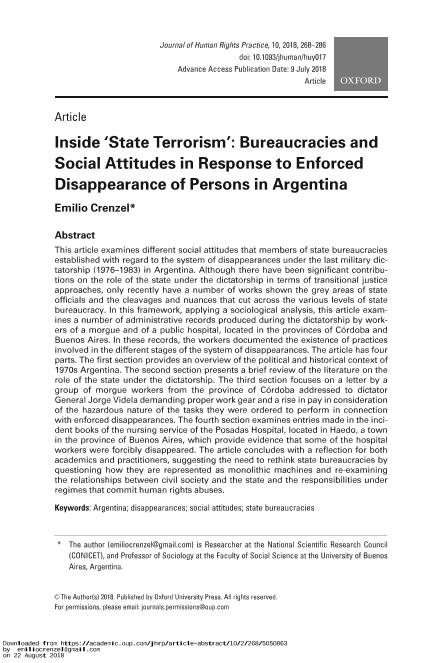Mostrar el registro sencillo del ítem
dc.contributor.author
Crenzel, Emilio Ariel

dc.date.available
2022-11-07T16:18:55Z
dc.date.issued
2018-07
dc.identifier.citation
Crenzel, Emilio Ariel; Inside State Terrorism: Bureaucracies and social attitudes in response to enforced disappearance of persons in Argentina; Oxford University Press; Journal of Human Rights Practice; 10; 2; 7-2018; 268-286
dc.identifier.issn
1757-9619
dc.identifier.uri
http://hdl.handle.net/11336/176745
dc.description.abstract
This article examines different social attitudes that members of state bureaucracies established with regard to the system of disappearances under the last military dictatorship (1976-1983) in Argentina. Although there have been significant contributions on the role of the state under the dictatorship in terms of transitional justice approaches, only recently have a number of works shown the grey areas of state officials and the cleavages and nuances that cut across the various levels of state bureaucracy. In this framework, applying a sociological analysis, this article examines a number of administrative records produced during the dictatorship by workers of a morgue and of a public hospital, located in the provinces of Có rdoba and Buenos Aires. In these records, the workers documented the existence of practices involved in the different stages of the system of disappearances. The article has four parts. The first section provides an overview of the political and historical context of 1970s Argentina. The second section presents a brief review of the literature on the role of the state under the dictatorship. The third section focuses on a letter by a group of morgue workers from the province of Có rdoba addressed to dictator General Jorge Videla demanding proper work gear and a rise in pay in consideration of the hazardous nature of the tasks they were ordered to perform in connection with enforced disappearances. The fourth section examines entries made in the incident books of the nursing service of the Posadas Hospital, located in Haedo, a town in the province of Buenos Aires, which provide evidence that some of the hospital workers were forcibly disappeared. The article concludes with a reflection for both academics and practitioners, suggesting the need to rethink state bureaucracies by questioning how they are represented as monolithic machines and re-examining the relationships between civil society and the state and the responsibilities under regimes that commit human rights abuses.
dc.format
application/pdf
dc.language.iso
eng
dc.publisher
Oxford University Press

dc.rights
info:eu-repo/semantics/openAccess
dc.rights.uri
https://creativecommons.org/licenses/by-nc-sa/2.5/ar/
dc.subject
ARGENTINA
dc.subject
DISAPPEARANCES
dc.subject
SOCIAL ATTITUDES
dc.subject
STATE BUREAUCRACIES
dc.subject.classification
Sociología

dc.subject.classification
Sociología

dc.subject.classification
CIENCIAS SOCIALES

dc.title
Inside State Terrorism: Bureaucracies and social attitudes in response to enforced disappearance of persons in Argentina
dc.type
info:eu-repo/semantics/article
dc.type
info:ar-repo/semantics/artículo
dc.type
info:eu-repo/semantics/publishedVersion
dc.date.updated
2022-11-07T15:39:12Z
dc.identifier.eissn
1757-9627
dc.journal.volume
10
dc.journal.number
2
dc.journal.pagination
268-286
dc.journal.pais
Reino Unido

dc.journal.ciudad
Oxford
dc.description.fil
Fil: Crenzel, Emilio Ariel. Universidad de Buenos Aires; Argentina. Consejo Nacional de Investigaciones Científicas y Técnicas; Argentina
dc.journal.title
Journal of Human Rights Practice
dc.relation.alternativeid
info:eu-repo/semantics/altIdentifier/url/https://academic.oup.com/jhrp/article-abstract/10/2/268/5050863?redirectedFrom=fulltext
dc.relation.alternativeid
info:eu-repo/semantics/altIdentifier/doi/http://dx.doi.org/10.1093/jhuman/huy017
Archivos asociados
